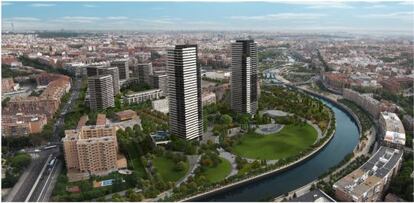Court upholds ban on replacing Atlético stadium with high-rises
City of Madrid will appeal the decision in a bid to move the soccer club to La Peineta

A regional court has struck down a longstanding plan by the city of Madrid and the soccer team Atlético de Madrid to replace the Vicente Calderón stadium with skyscrapers.
Under the plan, two 36-story residential towers would go up in an area near the Manzanares River where legislation establishes a maximum height of four floors.
The project has been plagued by financial and legal hurdles ever since its inception in 2008
The developers’ idea was to use the money from the sale of the 2,000 homes to finance construction of a new stadium in La Peineta, a decaying site once envisioned as part of Madrid’s Olympic bid.
Atlético was originally supposed to move this year; the deadline was then delayed to 2017.
But the project has been plagued by financial and legal troubles ever since its inception seven years ago.
In 2012, the Madrid Superior Court of Justice (TSJM) first halted it on the grounds that building that high was illegal. The original suit had been brought by an association of Atlético fans who disagreed with the plans to move.
But the city appealed to the Supreme Court, which ruled that the entire case had to be started from the beginning because it had not taken into account the position of another party with an interest in the case, the beermaker Mahou, whose old brewery is located next to the Vicente Calderón stadium.
Now, a fresh decision by the TSJM, to which EL PAÍS has had access, reiterates the freeze on the development project. City authorities have already announced that they will appeal this new ruling as well.
In order to circumvent its own building code, Madrid’s city council, which is ruled by the Popular Party (PP), changed zoning laws to allow the highrises to go up in the area. The regional assembly, also under PP control, sanctioned the changes to provide additional legal support to the project.
But this legal move was challenged in the courts by an association called Señales de Humo, made up of Atlético de Madrid members who were critical of the way the club was being run.
Atlético managers made a deal with Mahou to tear down the stadium and the brewery and build enough homes to cover the costs of buying the land where La Peineta stands (€41.2 million) and erecting a brand new stadium there (€195 million).
Despite the city coming up with a new development plan in 2014 that altered the number of floors to be built, among other things, the TSJM still considers that this project also falls under the four-floor rule.
Tu suscripción se está usando en otro dispositivo
¿Quieres añadir otro usuario a tu suscripción?
Si continúas leyendo en este dispositivo, no se podrá leer en el otro.
FlechaTu suscripción se está usando en otro dispositivo y solo puedes acceder a EL PAÍS desde un dispositivo a la vez.
Si quieres compartir tu cuenta, cambia tu suscripción a la modalidad Premium, así podrás añadir otro usuario. Cada uno accederá con su propia cuenta de email, lo que os permitirá personalizar vuestra experiencia en EL PAÍS.
¿Tienes una suscripción de empresa? Accede aquí para contratar más cuentas.
En el caso de no saber quién está usando tu cuenta, te recomendamos cambiar tu contraseña aquí.
Si decides continuar compartiendo tu cuenta, este mensaje se mostrará en tu dispositivo y en el de la otra persona que está usando tu cuenta de forma indefinida, afectando a tu experiencia de lectura. Puedes consultar aquí los términos y condiciones de la suscripción digital.








































